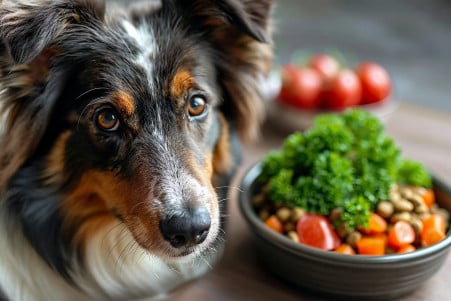Foods to Avoid If Your Dog Has Colitis: Dietary Caution
4 May 2024 • Updated 3 May 2024

If your dog has colitis, knowing what foods to avoid can help you better manage their condition and speed up their recovery. Foods that are high in fat, highly-processed, contain dairy products, or are hard for dogs to digest can make colitis worse and lead to more diarrhea.
Below, we will go over the specific ingredients in both commercial dog food and people food that you should avoid if your dog has colitis. This information is based on veterinary advice and scientific research that has looked at the impact of different dietary factors on dogs with inflammatory bowel issues. By using this knowledge, you can make better decisions about what to feed your dog when they are dealing with colitis.
What foods should be avoided if a dog has colitis?
Foods and Ingredients to Avoid for Dogs with Colitis
According to Pooch & Mutt's guide, some of the worst foods for dogs with colitis are high-fat foods, such as fatty meats, cheese, and greasy leftovers. These foods can lead to inflammation and make diarrhea worse. VCA Animal Hospitals warns that many commercial dog treats and snacks are highly processed and contain artificial preservatives and additives that can be hard on the digestive system.
Dogs with colitis are often lactose intolerant, so dairy products, including milk, cheese, and yogurt, can be hard for them to digest and should be avoided. Dogs with colitis are also more likely to have allergies, and Koha Pet explains that common allergens like wheat, corn, soy, and beef can trigger an immune response that makes colitis symptoms worse.
According to Cornell University veterinarians, spicy, heavily seasoned, high-fiber, and high-sugar foods can also cause digestive problems and should be avoided during a colitis flare-up. Cutting these foods and ingredients out of a dog's diet can help ensure that their colitis is kept in check and that their colon is able to heal.
Suggested Diets for Dogs With Colitis
Veterinarians typically recommend a low-fat, easy-to-digest diet for dogs with colitis, such as boiled chicken or turkey and white rice, according to VCA Animal Hospitals. Dog food that is specifically designed for gastrointestinal health or sensitive stomachs can also be helpful since it is made with highly digestible proteins and carbohydrates.
Limited-ingredient or novel protein diets, which only include a single protein that the dog has never eaten before, may help with inflammation, according to Bernie's Best. Prebiotics and probiotics can be added to the diet to help restore healthy gut bacteria and improve digestion, according to Butternut Box.
It's also important to make sure your dog stays hydrated, so be sure to provide them with fresh, clean water to drink throughout the day to help them heal.
Natural Remedies and Supplements for Colitis Management
Probiotics and digestive enzymes are recommended to help rebalance the gut microbiome and support digestion in dogs with colitis, per advice from The Pet Health and Nutrition Center. In addition, anti-inflammatory herbs like turmeric, ginger, and slippery elm are suggested to help soothe the digestive tract, as shown in WagWalking's list of natural treatments.
Fiber supplements such as psyllium husk or pumpkin are said to help with diarrhea and improve stool quality, according to the same WagWalking article. Omega-3 fatty acids from fish oil or krill oil supplements are recommended for their anti-inflammatory and gut-supporting properties, per the WagWalking article.
Although dietary changes are often the most important part of treatment, FullBucket Health's article explains that acupuncture and other holistic treatments may help some dogs with colitis, but these treatments should be used in conjunction with a vet. These natural remedies and supplements can be used in combination with dietary changes to help pet parents take a more well-rounded approach to managing their dog's colitis and supporting their gut health.
Long-Term Management Strategies for Chronic Colitis
If your dog has chronic or recurrent colitis, it is important to figure out what food triggers their colitis and to avoid those foods in the long term, according to PDSA. Regular vet visits and monitoring are important to make sure the condition is under control and to make any necessary changes to your dog's care, according to BluePearl Pet Hospital.
Reducing stress and other environmental factors that could cause a colitis flare-up can help prevent future episodes of colitis, according to the PDSA article. In some cases, long-term medication or immunosuppressive therapy may be needed to reduce inflammation and control symptoms, according to the review in PMC.
Feeding your dog a consistent, well-balanced diet and avoiding feeding them human food and treats can help prevent digestive problems and reduce the likelihood of colitis flare-ups, according to the article from BluePearl Pet Hospital. By doing these things, dog owners can help their dogs with chronic colitis find relief and enjoy a good quality of life.
When to See a Vet for Colitis
If your dog’s colitis symptoms don’t improve after a few days or get worse even after you’ve changed their diet, it’s time to see a vet, according to The Vets. If your dog is experiencing severe or bloody diarrhea, vomiting, weakness, and a loss of appetite, you should get them to the vet right away, says VCA Animal Hospitals.
If your dog’s symptoms don’t improve after you’ve changed their diet or tried natural remedies, you may need to have some diagnostic tests done and have your dog treated by a vet, according to the Merck Veterinary Manual. If your dog’s colitis is chronic or recurring, they may need more advanced treatments, including antibiotics, anti-inflammatory drugs, or immunosuppressive drugs, according to the same Merck Veterinary Manual article.
You should also make sure to take your dog to the vet for regular check-ups so that your vet can monitor their condition and make any necessary changes to their treatment plan, says BluePearl Pet Hospital. By taking your dog to the vet and making sure they’re monitored regularly, you can make sure that they get the care and treatment they need to manage their colitis effectively.
Conclusion: How to Support Gut Health in Dogs With Colitis
Colitis can be a serious condition that leads to discomfort and digestive issues in dogs if it is not managed properly. It is important to avoid certain foods and ingredients that can cause inflammation and irritation in the digestive tract in order to manage colitis and prevent symptoms from flaring up.
A well-rounded, easily digestible diet, as well as natural treatments and supplements, can help support gut health and healing in dogs with colitis. It is also important to make sure that dogs with chronic or severe colitis are monitored by a vet to ensure that they are managing their condition and overall health.
With the right diet, natural treatments, and help from a vet, many dogs with colitis can find long-term relief and have a good quality of life.


